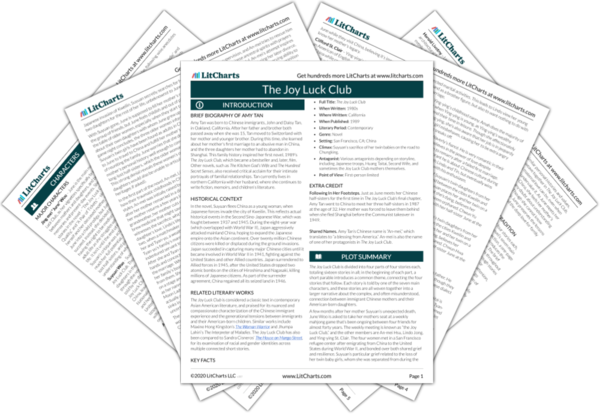Though storytelling is the main mode of communication in The Joy Luck Club, a constant conflict in the novel is the language barrier between Chinese and English. When first immigrating to the United States, the mothers wish for their children to speak perfect English and succeed as Americans. However, by assimilating into American culture, their daughters lose a sense of their Chinese heritage and inherited language, in fact they lose even the ability to fully understand that heritage or language. In the opening chapter, June remembers translating all of her mother’s comments in her head, but not retaining any meaning. While able to speak some English, the mothers feel most comfortable expressing ideas and stories in their native Chinese, which often cannot be translated into English. Though the daughters understand Chinese, they do not take the time to learn the language’s complexities, and therefore struggle with abstract concepts, resulting in frustration or misunderstanding.
With their broken English, the mothers are often viewed as less competent or alien in American society. Non-Chinese characters often speak condescendingly to them, or ignore them altogether. Still, it is the mistranslation within the family that is most devastating. Lena recounts the relationship between her white father and Chinese mother Ying-ying, and her role as translator between them. When her mother has a stillborn son and wails her grief, Lena’s father asks her to translate; rather than hurt him with her mother’s near-insane words, Lena lies and tells him a more positive message. This mistranslation prevents Lena’s father from properly supporting Lena’s mother through her subsequent depression, resulting in Ying-ying’s withdrawal from the family and life.
Tan highlights the difficulty of comprehendible expression by including Chinese or broken English in the dialogue, particularly with idioms. The reader must infer meaning rather than understand outright. During a fight with her husband, Lena can only express her anger in Chinese phrases, which aren’t translatable. Unable to understand her, Lena’s husband believes she’s deliberately shutting him out. The novel argues that immigrants are no less intelligent or complex, but often misinterpreted to the point of being silenced, even by their own families.
Immigration, Language, and Mistranslation ThemeTracker

Immigration, Language, and Mistranslation Quotes in The Joy Luck Club
In America I will have a daughter just like me. But over there nobody will say her worth is measured by the loudness of her husband’s belch. Over there nobody will look down on her, because I will make her speak only perfect American English.

Unlock explanations and citation info for this and every other The Joy Luck Club quote.
Plus so much more...
Get LitCharts A+“This feather may look worthless, but it comes from afar and carries with it all my good intentions." And she waited, year after year, for the day she could tell her daughter this in perfect American English.
Not know your own mother? How can you say? Your mother is in your bones!
All these years I kept my true nature hidden, running along like a small shadow so nobody could catch me. And because I moved so secretly now my daughter does not see me. She sees a list of things to buy, her checkbook out of balance, her ashtray sitting crooked on a straight table. And I want to tell her this: we are lost, she and I, unseen and not seeing, unheard and not hearing, unknown by others
"I don’t believe you. Let me see the book."
"It is written in Chinese. You cannot understand it. That is why you must listen to me."
“You can’t tell me because you don’t know! You don’t know anything!” And the girl ran outside, jumped on her bicycle, and in her hurry to get away, she fell before she even reached the corner.
I saw what seemed to be the prodigy side of me – because I had never seen that face before. I looked at my reflection, blinking so I could see more clearly. The girl staring back at me was angry, powerful. This girl and I were the same. I had new thoughts, willful thoughts, or rather thoughts filled with lots of won’ts. I won’t let her change me, I promised to myself. I won’t be what I’m not.
To this day, I believe my mother has the mysterious ability to see things before they happen. She has a Chinese saying for what she knows. Chunwang chihan: if the lips are gone, the teeth will be cold. Which means, I suppose, one thing is always the result of another.
That’s what she is. A Horse, born in 1918, destined to be obstinate and frank to the point of tactlessness. She and I make a bad combination, because I’m a Rabbit, born in 1951, supposedly sensitive, with tendencies toward being thin-skinned and skittery at the first sign of criticism.
And my mother loved to show me off, like one of the many trophies she polished. She used to discuss my games as if she had devised the strategies… and a hundred other useless things that had nothing to do with my winning.
“A mother is best. A mother knows what is inside you," she said above the singing voices. "A psyche-atricks will only make you hulihudu, make you see heimongmong."
Over the years, I learned to choose from the best opinions. Chinese people had Chinese opinions. American people had American opinions. And in almost every case, the American version was much better. It was only later that I discovered there was a serious flaw with the American version. There were too many choices, so it was easy to get confused and pick the wrong thing.
"You don’t understand," I protested.
"What I don’t understand?" she said.
And then I whispered, "They’ll think I’m responsible, that she died because I didn’t appreciate her."
And Auntie Lindo looked satisfied and sad at the same time, as if this were true and I had finally realized it.











